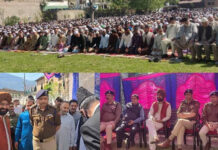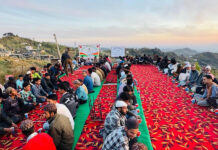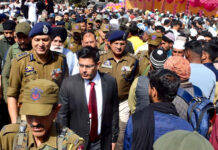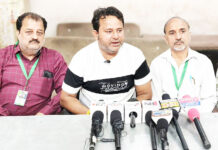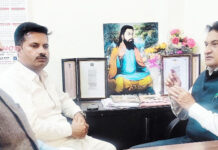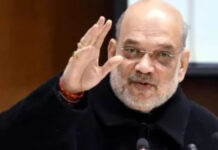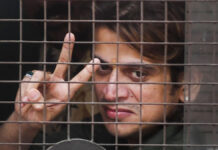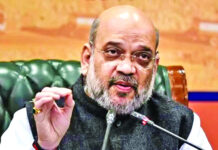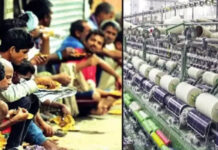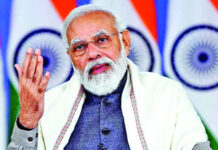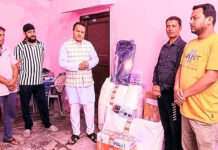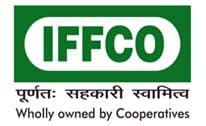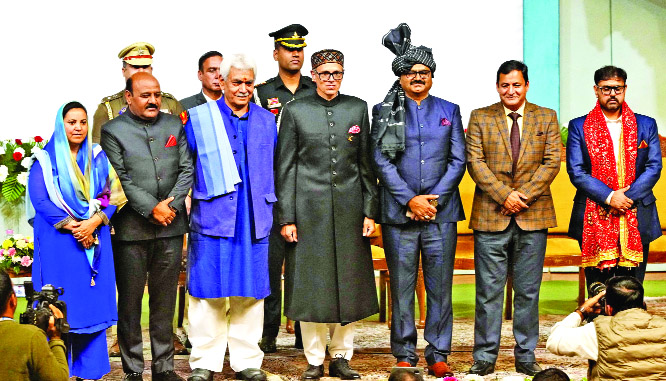DOGRA HERALD BUREAU
SRINAGAR, Oct 16
National Conference leader Omar Abdullah took oath as the Chief Minister of Jammu and Kashmir on Wednesday, heading the first elected government in the union territory since 2019 when its special status was revoked.
As Jammu and Kashmir turned another page in its troubled history, the 54-year-old was sworn in along with five other ministers, three from Jammu region and two from the Kashmir Valley. The effort towards regional balance within the administration was also reflected in his choice of deputy chief minister — Surender Choudhary from Jammu region’s Nowshera constituency.
The Congress, a member of the pre-poll alliance with the NC, has decided not to take up any ministerial positions in the new government as of now. The new Jammu and Kashmir government, which ends six years of direct central rule, can have up to nine ministers.
Lt Governor Manoj Sinha administered the oath of office and secrecy to Abdullah and his ministers at the Sher-e-Kashmir International Convention Centre along the banks of the Dal Lake.
Abdullah, who takes over as chief minister for a second term, is the third generation of the influential Abdullah family to occupy the office — after his grandfather Sheikh Abdullah and father Farooq Abdullah.
His first term as chief minister was from 2009 to 2014 when Jammu and Kashmir was a full-fledged state.
The five ministers sworn in were Choudhary, Sakina Masood (Itoo), Javed Dar, Javed Rana and Satish Sharma.
Deputy Chief Minister Choudhary is from Jammu as are Rana and Sharma. Itoo, the only woman minister, and Dar are from the Valley. While Abdullah took his oath in English, Choudhary did so in Hindi.
“I had said that we will not allow Jammu to feel they do not have a voice or representatives in this government. I have chosen a deputy chief minister from Jammu so the people of Jammu feel that this government is as much theirs as it is of the rest,” the new chief minister said soon after the ceremony.
Choudhary, who defeated BJP chief Ravinder Raina in Nowshera constituency, said the NC leadership had proved again that both Jammu and Kashmir divisions are equally important to them.
“This is the leadership which rises above political, religious and communal connotations and works for the people,” he said.
Discussing his council of ministers, Abdullah, who posted a photograph on X of himself in his office chair at the civil secretariat with the words “I’m back”, said there are three vacancies and “they will gradually be filled”.
As speculation mounted whether those would go to alliance partner Congress — while the NC won 42, the Congress bagged six — the event was also an occasion for INDIA bloc leaders to demonstrate their unity.
The swearing-in ceremony of the NC government comes in the backdrop of the NC-Congress win in Jammu and Kashmir and the Congress loss to the BJP in Haryana.
Among those who attended were Congress leaders Rahul Gandhi, Priyanka Gandhi Vadra and Mallikarjun Kharge, SP chief Akhilesh Yadav, Left leaders Prakash Karat and D Raja, DMK’s Kanimozhi and NCP’s Supriya Sule. PDP chief Mehbooba Mufti was there as well.
JKPCC chief Tariq Hameed Karra said the Congress will not join the council of ministers for the moment because it is “unhappy” that statehood has not been restored.
He added in a statement that the Congress would continue to fight for the restoration of statehood to J-K.
NC rival and INDIA bloc partner, PDP chief Mehbooba Mufti, said the day was “very auspicious” as the people of Jammu and Kashmir have got their government after several years.
“People have elected a stable government. People of Jammu and Kashmir suffered a lot especially after 2019, and we hope that this new government will heal the wounds we got,” she said.
“We hope that the government will pass a resolution condemning the decision of August 5, 2019, that the people of J-K do not accept those decisions,” she added.
No BJP leader, except Darakshan Andrabi, chairperson of Jammu and Kashmir Waqf Board, attended the oath ceremony.
The chief minister’s father, NC president Farooq Abdullah, bluntly laid out the hurdles in the road ahead.
In 2019, Article 370 was abrogated and the erstwhile state was bifurcated into the union territories of Jammu and Kashmir, and Ladakh.
Before being the swearing-in ceremony, Omar Abdullah addressed speculation of a rift between NC and the Congress.
“If all is not well, why would (Mallikarjun) Kharge (Congress president), Rahul (Gandhi) and other senior leaders of Congress would be coming here. Their presence here is indicative of the fact that the alliance is strong, and we will work for the people (of J&K).”
Replying to a question about non-inclusion of any Congress MLA in his cabinet, he said the national party is not out of the cabinet.
“It is for the Congress to decide. We have been in discussions with them. Principally around the fact that as a UT with a unicameral house, we don’t have the upper house. Therefore, the size of the government is severely restricted. Gone are the days when you would see 40 or 45 ministers,” he said.
Terming the union territory status of Jammu and Kashmir unfortunate, he said, “I have always maintained that our status as a UT is temporary one. We have commitments from the government of India, particularly from the prime minister, home minister and others that statehood will be restored to J-K and we hope that happens at the earliest”.
Abdullah’s family, including his father and mother Molly Abdullah, his two sisters, and two sons were present on the occasion.
Together, the NC and the Congress have a strength of 48, a majority in the 95-member assembly — five members are to be nominated by the LG.

